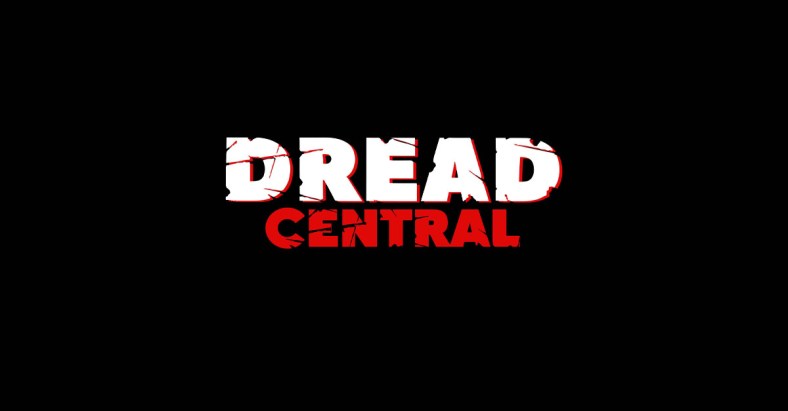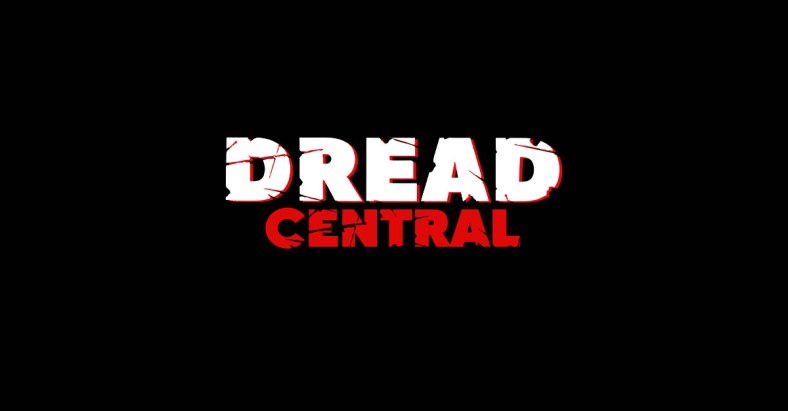Tribeca 2016: Fran Kranz and Adam Goldberg Talk Rebirth

Having recently portrayed a dutiful and overworked employee in festival favorite Bloodsucking Bastards, Fran Kranz slips back into a familiar treadmill lifestyle in Karl Mueller’s latest feature, Rebirth, only this time trading real-life vampires for metaphorical zombies.
Cue Kyle (Kranz), a pen pusher who we find working his butt off in social media, performing the same old rigmarole, day in, day out. Although seemingly content with the cards he’s been dealt, when an old friend, Zack (Adam Goldberg), turns up unannounced and invites him to a Rebirth self-help seminar, he starts to question the monotony of his very existence. Somewhat skeptical at first, Kyle can’t beat off that niggling curiosity inside of him and packs a weekend suitcase, only to end up lured down “a bizarre rabbit hole of psychodrama, seduction, and violence.”
With Rebirth (review) having screened at this year’s Tribeca Film Festival, Dread Central caught up with both Kranz and Goldberg to discuss this mordant yet deeply disturbing allusion to cult dynamics…

DC: So how did the premiere go?
Kranz: It went great. People enjoyed it but it was hard because the movie was physically exhausting for me. I had to relive the whole thing so I ended up feeling really, really tired. It was still a great movie but I just felt exhausted as my character goes through so much in this film.
DC: Something I also asked Karl Mueller and Harry Hamlin was if the audience gave any unexpected feedback in the Q&A after the film.
Kranz: People at Q&As at film festivals don’t ask questions EVER! They just don’t. It’s kind of hilarious and the moderator was like, “Well, erm, so…” Adam, were there any questions at all?
Adam: I remember someone asked if we would welcome comparisons to Fight Club and I think the answer was yes. I think Karl said that he WOULDN’T welcome them, but that he understands where they were coming from. [laughs]
Kranz: We’ve already been favorably compared to David Fincher and David Mamet so it’s great.
DC: And what was it about Karl’s biting satire on cult creeds that struck a chord with you both?
Kranz: I loved the script. I thought it was hysterical. It was so, so funny but – and this will sound strange – it leaves you with a bad taste in your mouth. I had just never really read a script like that before and I love original and creative new movies. It’s a really upsetting ending because of the fact that the majority of the movie plays out in real time in the events of one day, and then it has the balls to leave you with such an upsetting ending and sort of force the conversation about it. It was this ambiguous and provocative conclusion that really I loved about it. Even as an actor performing it, I am still not quite sure and I have my own theories about how this movie is supposed to play out for the character.
What was always important to me in the epilogue of the movie was to leave room for the audience to believe that Rebirth works and that it could be a positive thing. Cults obviously have this negative connotation and people are fascinated with them because there’s this mysterious quality to them but, in order to make the movie great and not just do it in a funny, comedy way, I thought we needed to leave Rebirth looking maybe successful and making this guy’s life actually better. It’s not just that he drank the Kool-Aid and that we can make fun of him, but all this role playing and these theatrical experiences have a real effect and have real results on his confidence and they empower him. That’s precisely what I think is unsettling about the movie that might make audiences uneasy.
DC: Adam, your character in the movie, Zack, basically scouts out people he thinks need to be reborn and need their eyes to be opened for them. Whilst the film doesn’t really spread things on overly thick in terms of cult beliefs per se, did you spend much time researching cult practices?
Goldberg: Yeah. I’m pretty familiar with this world because it’s always been a subject which has interested me; whether it’s cults or different groups. My parents-in-law were involved, to some degree, with cults here and there and they kind of had a wild late ’60s/early ’70s series of experiences which led them to different people. So it’s always been a subject matter that fascinated me but what made this film a little trickier is that, if you look at this from an audience member’s perspective, I don’t know how much this guy believes in the substance of what he’s saying so much as he is trying to compel Fran’s character and the organization at large for the sheer sake of being in control of a huge financial dynasty. How much of this is a product of his own genuine conviction and how much it is all a product of something more cynical is something that is left to your own interpretation. Whichever way you look at it, I just really needed to be able to manipulate these people and find their weaknesses and I think that’s something that’s not just found in cults but is involved in any kind of duress and it’s something we’re always able to tap into.
Kranz: I love how the characters’ motivations are unclear in this movie. It obligates the audience to question Zack’s role and, exactly as Adam was saying, question exactly what is his real motivation behind the organization and then Kyle, in the epilogue, begs you to ask just how committed he and his family are to it all.
DC: A lot of this audience doubting and questioning is provoked by Nicky Whelan’s character as she manipulates Kyle into making his own decisions using a circumbendibus approach.
Kranz: Yeah. She’s really sort of anachronistic with the group. You see all these kind of frat guys and she really stands out in terms of the project. I loved that because, again, this is something else that forces the audience to begin to interpret this person’s role in this “live theatre” to manipulate Kyle; for good or for bad. The stoniness of Nicky’s performance and her character is a great contrast to what’s happening in this place and it makes the mysteriousness that much more complex.
DC: The film is all about deceiving, not just Fran’s character, but also the audience. The dialogue in Rebirth is really fresh and legit, lending itself to creating an additional level of deception. Did Karl [Mueller] allow, or even invite, a certain amount of improvisation to help pull a fast one on the audience?
Kranz: Well the script was so good. Everyone across the board was in love with it for how funny it was and how discerning it was. We didn’t necessarily improvise that much, but I will say that because I loved the script so much I failed to realize just how demanding it was going to be, both physically and mentally. I basically unravel and have a major breakdown in the film so, just as an actor and as a person, to go into the shoot thinking I’m making this funny movie was like a healthy naiveté or ignorance about what it was actually going to be like. I’m not really a method actor but I was pretty broken; I was in pretty bad shape.
Goldberg: That’s absolutely true and I can totally attest to that.
Kranz: I spent a lot of time physically hanging on Adam just out of exhaustion. It was kind of a dependency on set because I’d been through quite a lot and, ironically, Adam was the guy in charge or in control of implementing and tormenting me.
Goldberg: Yeah. I watched this happen, so let me tell you this. On the record, I think that Fran had, in many ways, an unenviable role in that it is very difficult to gauge how open this guy is at any given moment and to not just to give effectively a homogenized performance. There are all these different layers and nuances and then humorous bits that Fran really, really surprised me with and he managed to pace himself in a way that even at times when it feels like the character’s completely out of control, Fran always feels in control. It wasn’t just all kinds of yelling and screaming. There were all these different ways Fran had to say he wanted to get out of that place and so many different ways of being incredulous. Without having an actor who was at that depth the film just would not have worked.
Kranz: I definitely want to thank you for saying that, Adam. I really appreciate that because that was the hardest challenge. Our constant conversation on set was, “Where has this guy been? Where is he coming from?” and, like I said, the movie plays out in real time and with shooting schedules that’s just never the way it is; you do not have that luxury. So to find that energy and to chart that was extremely difficult, but I’m proud of how it’s pulled off. It lead to some very exhausting and confusing days where Karl and I really had to debate and hash out where we thought everything was.
DC: The film poses so many questions. I’m guessing you asked yourselves a lot of questions given the subject matter involved. Would you say this project helped you learn things about yourselves that you weren’t aware of beforehand?
Kranz: Interesting. Excellent question. I don’t know if this is something that I care more about as the actor playing Kyle than maybe the audience members or the other actors will, but I really wanted not to just specifically make fun of cults and have this kind of allusion to Scientology in a spoof-like way. I thought it was interesting to open the conversation because people need community and they need connection and I think trusting in this process in our lives of getting a job and having a family shows how our lives are really mostly ordinary. I thought it was interesting to infuse our mostly ordinary lives, even if it was theatre or contrived, with excitement, sexuality, danger and adventure and produce real results. I mean, the followers of Rebirth actually have brand marks on their body and it reminds me of works and faith. It’s like circumcision or something; proving your faith in God or Rebirth or the community. Even if it’s completely contrived, there’s reality there and something to show for it and I think that’s a really complex conversation that you can have with yourself.
Thanks to Netflix’s latest campaign to delve deeper into the world of original films, viewers will be able to catch Rebirth amidst a torrent of quality genre movies premiering on said streaming service, including Mike Flanagan’s recent hit Hush and Babak Anvari’s highly-anticipated Sundance success Under the Shadow. We’ll be sure to let you know as soon as an official Rebirth release date rolls out.
Since this interview, Kranz signed up to play Pimli alongside Idris Elba and Matthew McConaughey in the upcoming feature film adaptation of Stephen King’s The Dark Tower which you can read all about over here.

Source: Cindy Ord/Getty Images North America
Categorized:News
